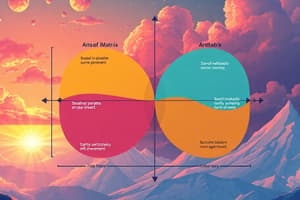Podcast
Questions and Answers
What is a key characteristic of services?
What is a key characteristic of services?
- Intangibility (correct)
- Tangibility
- Variability
- Perishability
Which of the following is NOT a characteristic of services?
Which of the following is NOT a characteristic of services?
- Inseparability
- Perishability
- Variability
- Tangibility (correct)
What type of service is provided directly to individual consumers?
What type of service is provided directly to individual consumers?
- Business-to-Consumer (B2C) Services (correct)
- Business-to-Business (B2B) Services
- Non-profit Services
- Government Services
What is the main difference between goods and services in terms of quality control?
What is the main difference between goods and services in terms of quality control?
What is the 'P' in the 7 Ps of Service Marketing that refers to the systems and procedures used to deliver the service?
What is the 'P' in the 7 Ps of Service Marketing that refers to the systems and procedures used to deliver the service?
What is service quality?
What is service quality?
Which of the following is an example of Business-to-Business (B2B) Services?
Which of the following is an example of Business-to-Business (B2B) Services?
What is physical evidence in the 7 Ps of Service Marketing?
What is physical evidence in the 7 Ps of Service Marketing?
Flashcards are hidden until you start studying
Study Notes
Definition of Service Marketing
- Service marketing is a sub-field of marketing that focuses on promoting and selling intangible goods, also known as services.
- Services are experiences or activities that provide value to customers, but do not result in the ownership of a physical product.
Characteristics of Services
- Intangibility: Services are invisible and can't be touched or seen.
- Inseparability: Services are often produced and consumed at the same time.
- Variability: Services can vary in quality and delivery from one provider to another.
- Perishability: Services cannot be stored or inventoried, and their value is lost if not used.
Key Differences Between Goods and Services
- Goods:
- Tangible
- Can be stored and inventoried
- Quality control is easier
- Services:
- Intangible
- Can't be stored or inventoried
- Quality control is more challenging
Types of Services
- Business-to-Consumer (B2C) Services: Services provided directly to individual consumers, e.g., healthcare, education, and hospitality.
- Business-to-Business (B2B) Services: Services provided to other businesses, e.g., consulting, logistics, and IT services.
- Government Services: Services provided by government agencies, e.g., public transportation, healthcare, and education.
Service Marketing Mix
- 7 Ps of Service Marketing:
- Product: The service itself
- Price: The cost of the service
- Promotion: Advertising, sales promotions, and public relations
- Place: The location and accessibility of the service
- People: The employees and staff delivering the service
- Process: The systems and procedures used to deliver the service
- Physical Evidence: The tangible aspects of the service, e.g., ambiance, equipment, and facilities
Service Quality and Customer Experience
- Service Quality: The degree to which a service meets customer expectations.
- Customer Experience: The overall feeling or attitude a customer has towards a service provider.
- Service Encounter: A specific interaction between a customer and a service provider.
Service Marketing Strategies
- Differentiation: Creating a unique service offering to stand out from competitors.
- Segmentation: Targeting specific customer groups with tailored services.
- Relationship Marketing: Building long-term relationships with customers.
- Branding: Creating a strong brand identity for the service provider.
Definition of Service Marketing
- Service marketing focuses on promoting and selling intangible goods, known as services.
- Services are experiences or activities that provide value to customers, but do not result in physical product ownership.
Characteristics of Services
- Intangibility: Services are invisible and cannot be touched or seen.
- Inseparability: Services are produced and consumed simultaneously.
- Variability: Services can vary in quality and delivery from one provider to another.
- Perishability: Services cannot be stored or inventoried, and their value is lost if not used.
Key Differences Between Goods and Services
- Goods are tangible, can be stored and inventoried, and have easier quality control.
- Services are intangible, cannot be stored or inventoried, and have more challenging quality control.
Types of Services
- Business-to-Consumer (B2C) Services: Directly provided to individual consumers, e.g., healthcare, education, and hospitality.
- Business-to-Business (B2B) Services: Provided to other businesses, e.g., consulting, logistics, and IT services.
- Government Services: Provided by government agencies, e.g., public transportation, healthcare, and education.
Service Marketing Mix
- 7 Ps of Service Marketing: Essential elements for service marketing.
- Product: The service itself.
- Price: The cost of the service.
- Promotion: Advertising, sales promotions, and public relations.
- Place: The location and accessibility of the service.
- People: The employees and staff delivering the service.
- Process: The systems and procedures used to deliver the service.
- Physical Evidence: The tangible aspects of the service, e.g., ambiance, equipment, and facilities.
Service Quality and Customer Experience
- Service Quality: The degree to which a service meets customer expectations.
- Customer Experience: The overall feeling or attitude a customer has towards a service provider.
- Service Encounter: A specific interaction between a customer and a service provider.
Service Marketing Strategies
- Differentiation: Creating a unique service offering to stand out from competitors.
- Segmentation: Targeting specific customer groups with tailored services.
- Relationship Marketing: Building long-term relationships with customers.
- Branding: Creating a strong brand identity for the service provider.
Studying That Suits You
Use AI to generate personalized quizzes and flashcards to suit your learning preferences.



